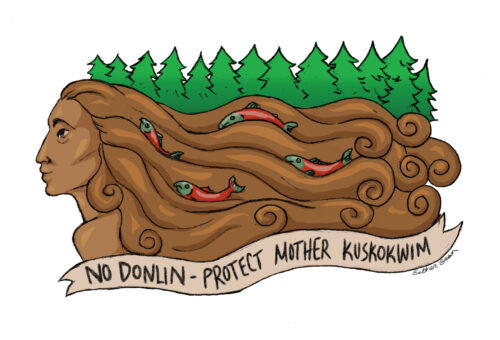
Protecting Kuskokwim River Salmon Partly Behind Tribal Lawsuit Challenging Interior Gold Mine
The following press release is courtesy of the Mother Kuskokwim Tribal Coalition:

Mother Kuskokwim Tribal Coalition Stands with Tribes that Filed Lawsuit to Stop Donlin Gold
Tribal leaders cite lack of climate analysis, incomplete human health impacts study, fisheries collapse and inadequate Tribal consultation as basis for appeal.
MAMTERILLEQ, ALASKA – The Mother Kuskokwim Tribal Coalition applauded today’s filing of a federal lawsuit by three Yukon-Kuskokwim Delta tribes that seeks to fix critical flaws in the environmental review process used to support the U.S. Army Corps of Engineers’ 2018 wetlands (404) permit for the proposed Donlin open-pit gold mine. If developed, Donlin, located in the headwaters of the Kuskokwim River system, would be the largest open pit gold mine in North America.
“As Tribal nations we have been calling on the Army Corps to put in place the protections that we know the majority of Yukon-Kuskokwim residents want, and to protect our ways of life by rejecting this ill-conceived, outdated mine proposal,” said Anaan’arar Sophie Swope, Director of the Mother Kuskokwim Tribal Coalition. “The Army Corps environmental impact statement process lacked climate analysis, relied on an incomplete human health impacts study, did not take into account the now occurring fisheries collapse in the Kuskokwim River, and contained wholly inadequate Tribal consultation. Under the law, inadequate consultation alone should compel the Corps to conduct a new analysis.”
The legal challenge seeks to overturn the Final Environmental Impact Statement for the mine and the 2018 joint record of decision approving the project signed by the U.S. Army Corps of Engineers, the Bureau of Land Management (BLM), and the U.S. Department of the Interior.
“Everyone who depends on our YK Delta food resources need to fully understand the risks of this mine and I’m grateful that more tribes are joining the fight. Barrick Gold’s history around the world makes clear they care little about environmental impacts and the people who live where they mine. I encourage all tribes to do their own research,” said Beverly Hoffman, a founder of the Mother Kuskokwim Coalition. “Our Mother Kuskokwim Tribal Coalition is committed to defending our way of life — which means fighting the placement of the largest open mine in the world along our river. Too often, human error in large extraction projects causes irreversible harm to the land, water and air. The Kuskokwim River is far too important to our ways of life to allow that to happen.”
Specifically, Tribes are asking that the federal agencies be required to study impacts to downstream waters and villages from a potentially catastrophic tailings dam failure, which the agencies refused to do in the Environmental Impact Statement despite multiple requests from downstream communities. The Tribes also want federal agencies to consider and prevent predicted impacts to Kuskokwim River rainbow smelt. Propeller wash from Donlin’s barges could kill or injure rainbow smelt, which are an important subsistence food source for people in the region and are a key prey species for salmon. Finally, the Tribes are asking the court to require the federal agencies to address serious human health concerns identified by the Alaska Department of Health but ignored in the Environmental Impact Statement.
This is the first federal lawsuit filed against the mine.
Background
The Donlin Gold project is expected to extract 556 million tons of ore to produce about 30 million ounces of gold over the 27-year life of the mine – and would generate 2.5 billion tons of waste rock, some of which would generate acid drainage. The waste rock pile would be up to 1,115 feet tall and would span 2,500 acres, some of which is currently important salmon habitat
The full list of Tribes formally opposed to Donlin Gold by adoption of resolution includes: Orutsararmiut Native Council, Native Village of Eek, Kasigluk Traditional Council, Native Village of Kwigillingok, Chuloonawick Native Village, Native Village of Kongiganak, Native Village of Tununak, Chevak Native Village, Native Village of Napakiak, Chefornak Traditional Council, Nightmute Traditional Council, Native Village of Nunapitchuk, Kwinhagak Tribal Council, Tuluksak Tribal Council, Organized Village of Kwethluk, Aniak Traditional Council
More information can be found at www.nodonlingold.org



